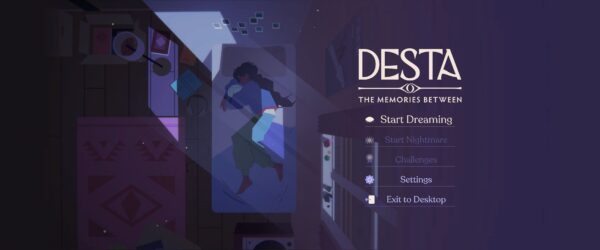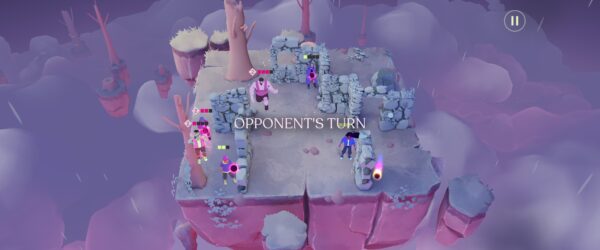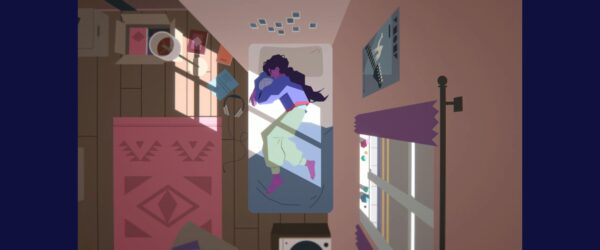There’s only a handful of developers I get excited about these days. I mean sure, the big AAA titles from the usual suspects still manage to grab my attention, but I had a small sense of pride around following those smaller ones who consistently put out titles that punched well above their weight. Seems I’d been sleeping on one developer though, one who’s responsible for probably the best mobile game experience I can recall: Monument Valley. For some reason or another I’d just forget to check-in on what they were up to and, of course, when I looked I saw that they’d been anything but idle. Better still they’d just released their latest game so, with serendipity pushing us together, I gave it a whirl.

Desta is finally returning home after many years of being away, their mother finally getting around to selling the family home that she grew up in. They left a lot behind there, the grief of losing their father making it hard to hold onto anything from there. But now they’re here, sitting in their old bedroom, and the memories of their friends and family visited them in their dreams. It’s here that Desta will learn to deal with the trauma that they left here and, hopefully, find some way to heal the real world.
Desta’s art style is firmly in the indie aesthetic du jour, low-poly and low textures with a high level of stylization on all the visual elements. This is interspersed with short cutscenes that are done in the old school flash animation style although employing a similar art direction to keep them linked from a style point of view. Given this saw simultaneous release on PC, Switch and Android reasons behind the low end graphics are clear but the game certainly doesn’t suffer for it. Indeed I was (somewhat naively) thinking I’d be playing Desta on my Switch since I would’ve finished Zelda whilst I was still travelling and I’m sure the experience would be almost the same on there.

The game play experience mirrors that of Pyre, being a kind of turn based sports game with roguelike elements thrown in for variety and replayability. It’s basically like a game of dodgeball: you have to hit your opponents enough to get them out of the game before they do the same to you. You have a number of special abilities that vary by the characters you choose, and all of them will gain experience at the end of each fight which eventually levels them up granting all the usual kinds of benefits. Enemies have abilities too though, meaning that you’re going to need to employ some level of strategy lest you get knocked out too quickly. All of these mechanics are tied into the story as well, as each of the characters you unlock are part of the story and each level of up of them reveals some additional interactions that add more colour to their relationships.
Now I’m not one for turn based strategy games and I really struggled to find much enjoyment with Desta’s main gameplay loop. To be sure some parts of it were fun for a little bit, like discovering that with a well placed shot you could bounce the ball right back to you, but after a while it just felt repetitive. Couple that with the fact that the roguelike nature means you lose most (not all though) progress when you fail a dream sequence and it took away much of the sense of achievement that’d keep driving me forwards. The game thankfully doesn’t force you to replay sections over again once you’ve completed them, but it also penalises you slightly for not doing so. Given how tightly tied the narrative is to the game elements this was a little frustrating but I can understand why it was done.

The progress elements aren’t explained super well but it is at least a lot less brutal than other games in the genre. Levelling up characters makes them significantly better overall, giving them additional health and abilities which are absolutely needed in the later levels. I will admit though that some of the characters feel a lot weaker than the others as the handful of times I tried different combos I often found myself coming straight back to my most levelled characters for the next round because they were just that much better. I’m sure there’s some amazing builds out there using characters I felt weren’t really up to scratch, but I certainly didn’t find the drive to figure them out.
The narrative ebbs and flows between being really compelling and mediocre, the main character not receiving enough backstory before jumping into the main game elements to make things compelling. To be sure things start to get a lot better the further along you get, Desta’s world being filled with all sorts of interesting characters that are given ample time to shine should you let them. But between the on-the-drip nature of those additional story elements, along with the whole thing basically being “in a dream” it made it somewhat hard to connect with fully.

Desta: The Memories Between is a game I set out to like, given the heritage of the developers. Perhaps that was an unkind place to start with it as Desta is nothing like the games I know ustwo for, being a turn based strategy that I have penchant for not enjoying much. To be sure it’s crafted well, with good voice acting and obvious investment in the soundtrack, but with a core game loop I didn’t enjoy much and a narrative that, overall, felt middle of the road I didn’t find a whole bunch to rave about here. Will I stop playing games from them because of this? Hell no, but I’ll certainly be resetting my expectations a bit as not every game they make can be another Monument Valley.
Rating: 7.0/10
Desta: The Memories Between is available on PC, Nintendo Switch and Android right now for $24.95. Game was played on the PC with a total of 3.2 hours playtime and 31% of the achievements unlocked.



